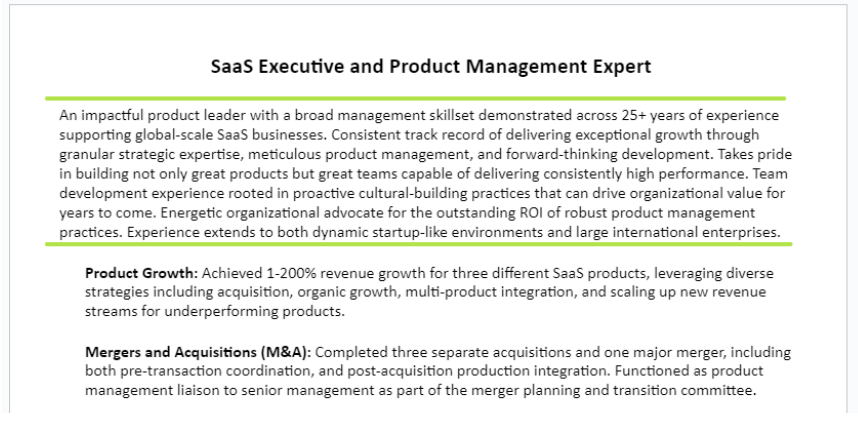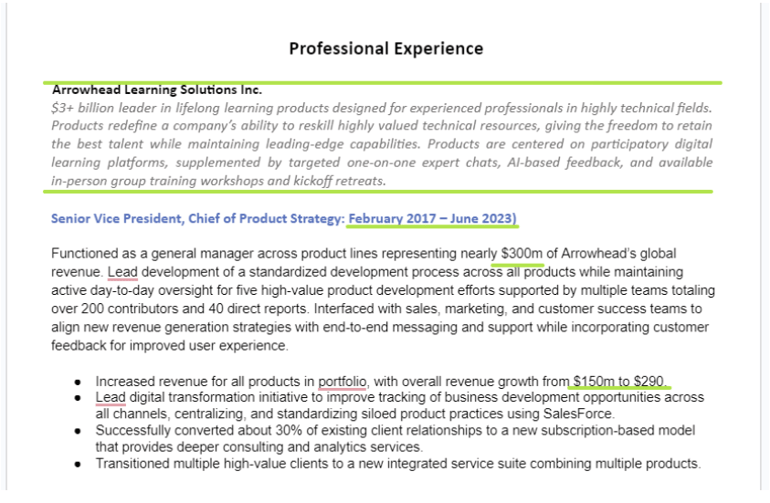An Ed Tech Resume Guide
Considering applying for a position in the Ed Tech industry? In this article, we explain why including the right elements, being specific, and effective storytelling are important for developing a resume that does your career accomplishments justice while providing an accurate, informative asset for recruiters and hiring managers.
The resume screenshots below have been anonymized and are for illustrative purposes only.
Ed Tech Resume: An Opportunity to Define Your Narrative
Before I dive into some more specific tips, I think it’s important to set the stage for why I think each of the recommendations below is important. A job search can be a stressful time, and many candidates understandably approach resume-building from a position of anxiety. Many people simply don’t know what “should” be on their resume, and a few hours spent on Google can leave individuals with 100 different ideas about what needs to be included. In practice, this can lead to resumes that function as laundry lists of disparate elements without providing any coherent narrative.
I think this is the single most important idea to keep in your mind when developing your resume: narrative.
It can be too easy to approach a resume as a merely factual document, a list of evidence that will be evaluated on its merits. The fact is, however, that busy recruiters and/or hiring managers will likely not have the time to go over each resume with a fine-toothed comb. In many cases, they will have only a few minutes to glean the story of your whole career. In this context, it is critical to think about how you can leverage each element of your resume to tell the story that you want to be told.
Ed Tech Resume Objective Statements or Summaries Are The Launching Pad for a Strong Narrative
By objective statement, I mean this section near the top of the resume.

It is all too common to see resumes that treat this section as an afterthought. But I argue that it is likely the most important section on the entire resume.
First, it is one of two substantive sections that is likely to be the first thing reviewed by a recruiter or hiring manager (the other are keywords, see the next tip below). As such, this statement is an opportunity to define how the rest of your resume will be read, address any potential complications upfront, and provide immediate proof that your resume is thoughtfully crafted.
Second, the objective statement is your strongest opportunity to articulate the “why” underpinning your application and highlight nuances that may not come out of your experience or education questions from a quick scan. I recommend never wasting this objective statement with a generic sentence about “an experienced professional seeking a job in the XYZ industry.” Instead, use it to establish the themes that you want readers to see across your experience and education.
Skills and Accomplishments Keywords Matter
Different resume guides may refer to this section as the “skills” or “accomplishments” portion. Today, it is critical to understand that the terms used in this part of the resume are likely to function as “keywords” as well. Recruiters and hiring managers increasingly make use of digital tools for searching, filtering, and automatically extracting key data from submitted resumes. And in many cases, featuring specific keywords can be the key to advancing through this process. Even for resumes being reviewed by humans, specific keywords (particularly those expressed in bold-faced headings early in the resume) are likely to be one of the first filtering mechanisms employed.
Of course, a concise resume only has space to list a half-dozen or so key attributes in this area at most, so prioritization matters. I recommend avoiding generic keywords to focus on the sort of rare or mission-critical skills that are most likely to be used as filtering criteria.
Consider the example below. Just about every resume for a management-level position will include words like “leadership”; these terms may be an important part of your story, but they are not likely to be employed as a keyword filtering criterion. But consider a company seeking a product management executive for a role focused on finding new revenue streams for defunct IP; in this case, including a term like “intellectual property” is far more likely to help this resume stand out to a recruiter (or resume filtering algorithm).

Be Specific!
Being specific on your resume is another extension of controlling your own narrative. If you have an employment gap, abrupt career transition, or other notable blip on your resume, I almost always recommend taking the time to proactively explain. In almost every case, a recruiter or hiring manager will notice these things, and candidates rarely do themselves any favors with ambiguity.
- List specific start and end dates for employment when necessary. If you worked in a position from December 2016 to January 2018, don’t write something like “2016-2018” that implies you accrued three years of experience. Recruiters and hiring managers do their own background research, and such statements can come off as vague at best, and dishonest at worst.
- Don’t assume the reader has heard of your past employers. A name that is widely respected in one industry might not be recognized in another, and you should never assume that your reader will be familiar with your past employers. A brief, factual employer description is a great way to bring out the most important facts.
- Use data and numbers to support your accomplishments. Quantitative statements are a great way to give weight to your claims and concretely demonstrate past performance.

Learn More About Jobs in Ed Tech
Resumes are a particularly important tool in an industry like Ed Tech, which is defined by diverse backgrounds, skills, and roles, and the tips above can go a long way toward helping your resume stand out for a role that is well suited for your goals and abilities.
If you are interested in learning more about a career in Ed Tech, this article takes a deeper look at the benefits of working in this exciting space.
Or, if you are interested in browsing open positions, we invite you to explore the largest dedicated jobs platform for the Ed Tech industry here.

